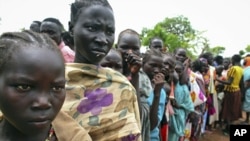GENEVA —
The U.N. refugee agency warns that the risk of hepatitis E is growing in refugee camps in South Sudan and that it has run out of cash and fears it may not be able to contain an outbreak of the disease.
UNHCR, various aid agencies and national health authorities in South Sudan are already fighting an outbreak of Hepatitis E in Upper Nile and Unity states. The disease is endemic in these regions and a threat to some 175,000 Sudanese refugees who are sheltering there.
The UNHCR reports more than 1,000 refugees already have become ill with Hepatitis E, a virus that is contracted and spread through contaminated food and water. The disease damages the liver and can be fatal.
According to UNHCR spokesman Adrian Edwards, 26 refugees have died in camps in Upper Nile, 10 since mid-September.
“The risk of infection is high in densely populated settings such as refugee camps," he said, explaining that women and small children are most vulnerable, and early diagnosis is crucial for the survival. "This is further exacerbated in the rainy season, due to flooding and poor sanitation."
The U.N. agency, he added, is working with the U.S. Centers for Disease Control, which has sent six staff to test water and blood samples, and conduct house-to-house interviews on hygiene practices.
Fighting is still going on in Sudan’s Blue Nile and South Kordofan states, where rebels are battling the government. Due to the escalating conflict, the UNHCR says it expects between 30,000 and 40,000 new refugees to cross into South Sudan in the coming weeks, as soon as the rainy season ends and roads become passable.
Edwards says the new arrivals will heighten the current situation and increase the risk of Hepatitis E spreading among the refugee population.
He says the UNHCR and other aid agencies are taking measures to counter the spread of the disease among the 175,000 refugees already in South Sudan.
“We are promoting better hygiene practices through hundreds of trained community workers," he said. "In all camps, the community outreach includes active case finding. We have also been working to improve the supply of clean water in the camps, as well as to upgrade latrines, and provide more hand washing-stations and soap.”
There is no treatment for acute hepatitis. Prevention is considered the most effective approach against the disease. Edwards says the measures that are in place are helping to slow the spread of the disease, but that agencies are struggling to provide each refugee with a minimum of 15 to 20 liters of safe drinking water per day and build enough latrines.
UNHCR needs a minimum of $20 million by the end of the year to keep up basic lifesaving activities, he says.









